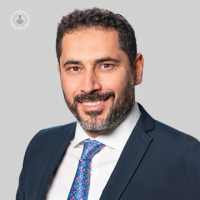Thyroid nodules: What are the signs to look out for?
Written by:Although most thyroid nodules are harmless and do not cause any symptoms, some patients may experience difficulty swallowing and discomfort in the neck or may notice a swelling in the area.
In this expert guide, highly esteemed consultant thyroid and endocrine surgeon, Mr Tarek Abdel-Aziz, explains what thyroid nodules are and who is more likely to develop them, as well as the importance of seeing your doctor about any symptoms or changes you observe.

What are thyroid nodules? How do they form?
Thyroid nodules are lumps that develop within the structure of your thyroid gland. The main cause is unknown, but thyroid nodules and thyroid enlargement are more common in women than men and increase in frequency with age. Women often develop thyroid enlargement during pregnancy and thyroid nodules also develop in countries with iodine deficiency. Other factors might include a family history of thyroid nodules, history of exposure to irradiation, obesity and smoking.
What symptoms do they cause?
In most cases thyroid nodules are harmless and do not cause symptoms, however, if enlarged or multiple, they may cause difficulty in swallowing or breathing, change of voice, and neck discomfort.
Are they always a cause for concern?
Most thyroid nodules are non-cancerous. It has been reported that the prevalence of a clinically palpable (i.e. able to be felt by touch) thyroid nodule is five to 10 per cent in randomly-selected individuals, with the incidence increasing to between 19 and 68 per cent, in part due to the introduction of high-resolution ultrasound.
By 60 years of age, about half of all people will have a thyroid nodule that can be detected either clinically by examination or by imaging. Although around 90 per cent of all nodules are benign, between seven and 15 per cent could be cancerous.
What are the treatment options?
If you have a nodule or swelling in your neck you should see your doctor as soon as possible. Your doctor will assess the swelling and refer you to a specialist clinic if necessary. Most nodules and swellings are harmless, but it is always best to have them checked promptly in case they are among the few that are cancerous.
The usual tests which are performed to investigate a thyroid nodule or an enlarged thyroid gland include an ultrasound scan, which may be accompanied with a fine needle biopsy to have a closer look at the cells under a microscope, blood tests, and rarely a nuclear medicine scan.
When is surgery necessary?
Although most thyroid nodules do not require treatment or could be followed up in clinic, surgery remains the treatment of choice for thyroid nodule which are cancerous, suspicious, or if they are causing pressure symptoms in the neck.
If you are concerned by pressure symptoms or a swelling in the neck and wish to book a consultation with Mr Abdel-Aziz, you can do so by visiting his Top Doctors profile.


